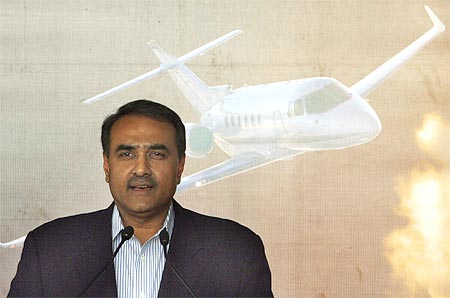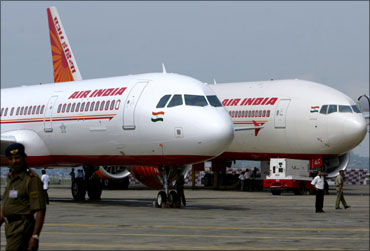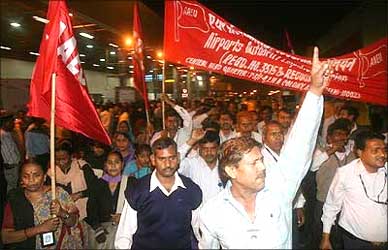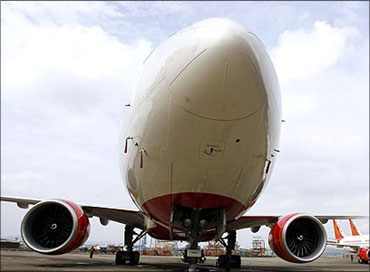Photographs: Rediff Archive T N Ninan
Vayalar Ravi, the new minister for civil aviation, declared on assuming office that his priority would be "to improve the services on Air India and to make it a profitable airline".
He allayed the fears of Air India employees' unions about a wage freeze and re-deployment to the airline's subsidiaries. For good measure, he added that he would look into the de-registration of two of the airline's 14 unions.
Mr Ravi's predecessor, Praful Patel, had declared that he was the minister for civil aviation, not the minister for Air India. His critics would charge that he was actually the minister against Air India, given how the airline was destroyed on his watch.
Indeed, Capt Gopinath of the erstwhile Deccan Aviation once charged that Mr Patel was the minister for Jet Airways -- drawing a sharp riposte from the minister.
. . .
Why the new minister may not be good for Air India
Image: Former aviation minister Praful Patel.Photographs: Reuters
Irrespective of whom you believe, there were sounds of relief from Air India when Mr Patel was moved out. The problem, though, is that the country once again seems to have a minister for Air India, more than a minister for civil aviation.
It so happens that Air India is now only the fourth-largest airline in the country. It is in danger of becoming the fifth largest, because SpiceJet too may overtake it.
So the 'national carrier' is no longer a critical factor in the market. In any case, reviving it is the job of the airline management.
Trade union recognition, wage bills and staff deployment are all within the management's purview -- with due clearance from the airline's board, which includes government nominees.
. . .
Why Vayalar Ravi may not be good for Air India
Image: Air India aircraft.Photographs: Reuters
Besides, how exactly would a minister improve Air India's services? Everyone knows that Air India cannot be salvaged if it does not cut costs and attract more passengers.
But if the minister signals that he is on the side of the unions on key staff issues, he reduces the management's scope of action as well as the likelihood of better service.
The prospects for the airline are already dim; Mr Ravi, with all the goodwill that he has for Air India, has just made its future bleaker.
The bald fact is that, given its one-sixth share of the aviation market, Air India's demise would not make much difference to anyone who is not its employee.
. . .
Why Vayalar Ravi may not be good for Air India
Photographs: Reuters
Privatisation would be a softer option than closure, but many people like Mr Ravi, including the majority of politicians, would consider even that unthinkable. In any case, the employees would go on strike, and that might make potential buyers stay away.
If someone did come forward, it would only be because the airline was going cheap. But a cheap sell would make privatisation even less palatable ("Family jewels being sold for a song!").
So the government (i.e. the taxpayer) will have to pick up the bill. The question is why should we? So that Mr Ravi can be nice to the unions?
The truth is that the majority of elderly Indian politicians (among them the 73-year-old Mr Ravi) cut their milk-teeth in the heyday of Jawaharlal Nehru, who dreamt of the public sector occupying the commanding heights of the economy.
. . .
Why Vayalar Ravi may not be good for Air India
Photographs: Reuters
Many of the rest were schooled in Indira Gandhi's populism. The first has been dead for nearly a half-century, the second for a quarter-century.
But their approaches to public policy have proved resilient to an unusual degree, even as the reality has changed (public sector Plan investment, for instance, has shrunk from over a half of the total to less than a fifth).
But while the private sector now occupies the heights, the pity is that our pro-market politicians are all too often in bed with crony capitalists.







article